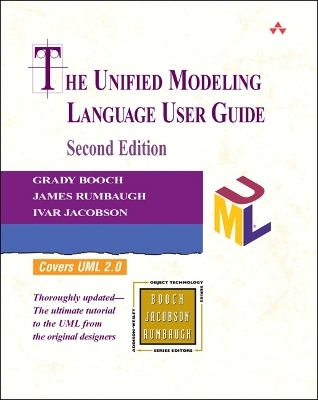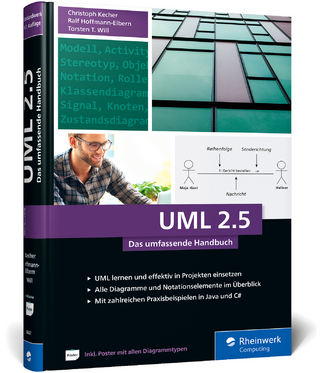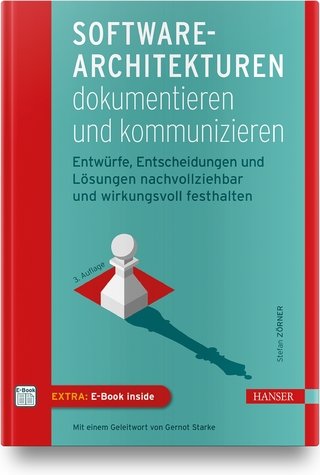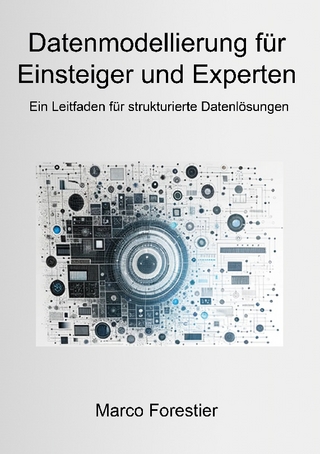
Unified Modeling Language User Guide, The
Addison Wesley (Verlag)
978-0-13-485215-7 (ISBN)
In this eagerly anticipated revision of the best-selling and definitive guide to the use of the UML, the creators of the language provide a tutorial to its core aspects in a two-color format designed to facilitate learning. Starting with an overview of the UML, the book explains the language gradually by introducing a few concepts and notations in each chapter. It also illustrates the application of the UML to complex modeling problems across a variety of application domains. The in-depth coverage and example-driven approach that made the first edition of The Unified Modeling Language User Guide an indispensable resource remain unchanged. However, content has been thoroughly updated to reflect changes to notation and usage required by UML 2.0.
Highlights include:
A new chapter on components and internal structure, including significant new capabilities for building encapsulated designs
New details and updated coverage of provided and required interfaces, collaborations, and UML profiles
Additions and changes to discussions of sequence diagrams, activity diagrams, and more
Coverage of many other changes introduced by the UML 2.0 specification
With this essential guide, you will quickly get up to speed on the latest features of the industry standard modeling language and be able to apply them to your next software project.
Grady Booch, James Rumbaugh, and Ivar Jacobson are the original designers of the Unified Modeling Language and three of the most widely known names in the field of software engineering. Accomplished authors, they are recognized worldwide for many significant contributions to the development of object technology, including the Booch Method, the Object Modeling Technique (OMT), and the Objectory (OOSE) Process. Booch and Rumbaugh work at IBM, and Jacobson is an independent consultant.
Preface xiii Part 1: Getting Started 1 Chapter 1: Why We Model 3 The Importance of Modeling 4
Principles of Modeling 8
Object-Oriented Modeling 10
Chapter 2: Introducing the UML 13 An Overview of the UML 14
A Conceptual Model of the UML 17
Architecture 31
Software Development Life Cycle 33
Chapter 3: Hello, World! 37 Key Abstractions 38
Mechanisms 41
Artifacts 43
Part 2: Basic Structural Modeling 45 Chapter 4: Classes 47 Getting Started 47
Terms and Concepts 49
Common Modeling Techniques 54
Hints and Tips 59
Chapter 5: Relationships 61 Getting Started 62
Terms and Concepts 63
Common Modeling Techniques 69
Hints and Tips 74
Chapter 6: Common Mechanisms 75 Getting Started 76
Terms and Concepts 77
Common Modeling Techniques 84
Hints and Tips 88
Chapter 7: Diagrams 89 Getting Started 90
Terms and Concepts 91
Common Modeling Techniques 96
Hints and Tips 101
Chapter 8: Class Diagrams 103 Getting Started 103
Terms and Concepts 105
Common Modeling Techniques 106
Hints and Tips 113
Part 3: Advanced Structural Modeling 115 Chapter 9: Advanced Classes 117 Getting Started 117
Terms and Concepts 118
Common Modeling Techniques 130
Hints and Tips 131
Chapter 10: Advanced Relationships 133 Getting Started 134
Terms and Concepts 135
Common Modeling Techniques 148
Hints and Tips 149
Chapter 11: Interfaces, Types, and Roles 151 Getting Started 151
Terms and Concepts 153
Common Modeling Techniques 157
Hints and Tips 161
Chapter 12: Packages 163 Getting Started 164
Terms and Concepts 165
Common Modeling Techniques 170
Hints and Tips 174
Chapter 13: Instances 175 Getting Started 175
Terms and Concepts 176
Common Modeling Techniques 182
Hints and Tips 183
Chapter 14: Object Diagrams 185 Getting Started 185
Terms and Concepts 187
Common Modeling Techniques 188
Hints and Tips 191
Chapter 15: Components 193 Getting Started 193
Terms and Concepts 194
Common Modeling Techniques 203
Hints and Tips 205
Part 4: Basic Behavioral Modeling 207 Chapter 16: Interactions 209 Getting Started 210
Terms and Concepts 211
Common Modeling Techniques 221
Hints and Tips 222
Chapter 17: Use Cases 225 Getting Started 225
Terms and Concepts 228
Common Modeling Techniques 236
Hints and Tips 237
Chapter 18: Use Case Diagrams 239 Getting Started 239
Terms and Concepts 241
Common Modeling Techniques 242
Hints and Tips 248
Chapter 19: Interaction Diagrams 249 Getting Started 250
Terms and Concepts 251
Common Modeling Techniques 260
Hints and Tips 264
Chapter 20: Activity Diagrams 267 Getting Started 268
Terms and Concepts 269
Common Modeling Techniques 280
Hints and Tips 284
Part 5: Advanced Behavioral Modeling 285 Chapter 21: Events and Signals 287 Getting Started 287
Terms and Concepts 288
Common Modeling Techniques 293
Hints and Tips 296
Chapter 22: State Machines 297 Getting Started 298
Terms and Concepts 300
Common Modeling Techniques 315
Hints and Tips 318
Chapter 23: Processes and Threads 319 Getting Started 320
Terms and Concepts 321
Common Modeling Techniques 326
Hints and Tips 330
Chapter 24: Time and Space 331 Getting Started 331
Terms and Concepts 332
Common Modeling Techniques 335
Hints and Tips 338
Chapter 25: State Diagrams 339 Getting Started 340
Terms and Concepts 341
Common Modeling Techniques 343
Hints and Tips 347
Part 6: Architectural Modeling 349 Chapter 26: Artifacts 351 Getting Started 351
Terms and Concepts 352
Common Modeling Techniques 355
Hints and Tips 360
Chapter 27: Deployment 361 Getting Started 361
Terms and Concepts 362
Common Modeling Techniques 366
Hints and Tips 368
Chapter 28: Collaborations 369 Getting Started 369
Terms and Concepts 371
Common Modeling Techniques 376
Hints and Tips 382
Chapter 29: Patterns and Frameworks 383 Getting Started 383
Terms and Concepts 385
Common Modeling Techniques 389
Hints and Tips 394
Chapter 30: Artifact Diagrams 395 Getting Started 395
Terms and Concepts 396
Common Modeling Techniques 398
Hints and Tips 407
Chapter 31: Deployment Diagrams 409 Getting Started 409
Terms and Concepts 411
Common Modeling Techniques 413
Hints and Tips 419
Chapter 32: Systems and Models 421 Getting Started 421
Terms and Concepts 423
Common Modeling Techniques 426
Hints and Tips 428
Part 7: Wrapping Up 431 Chapter 33: Applying the UML 433 Transitioning to the UML 433
Where to Go Next 435
Appendix A: UML Notation 437 Appendix B: Rational Unified Process 443 Glossary 451 Index 463
| Erscheinungsdatum | 04.07.2017 |
|---|---|
| Reihe/Serie | Addison-Wesley Object Technology Series |
| Verlagsort | Boston |
| Sprache | englisch |
| Maße | 190 x 234 mm |
| Gewicht | 900 g |
| Themenwelt | Informatik ► Software Entwicklung ► UML |
| ISBN-10 | 0-13-485215-X / 013485215X |
| ISBN-13 | 978-0-13-485215-7 / 9780134852157 |
| Zustand | Neuware |
| Haben Sie eine Frage zum Produkt? |
aus dem Bereich


